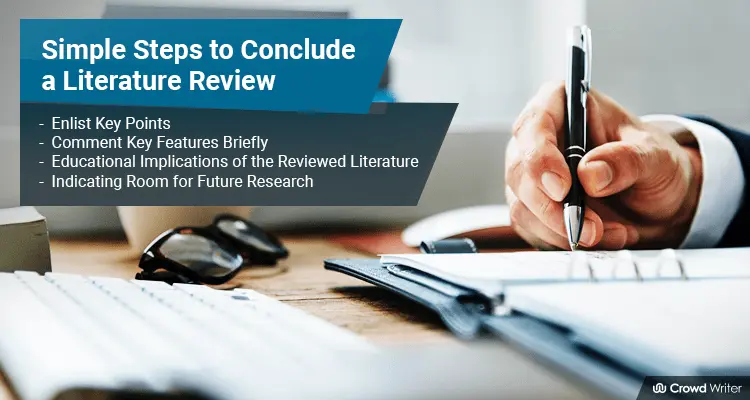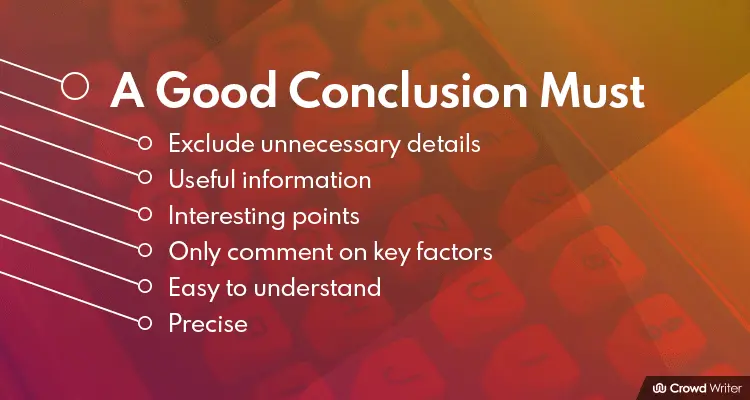How to Conclude a Literature Review
By Laura Brown on 6th March 2019
The conclusion of the dissertation literature review focuses on a few critical points,
- Highlight the essential parts of the existing body of literature in a concise way.
- Next, you should analyse the current state of the reviewed literature.
- Explain the research gap for your chosen topic/existing knowledge.
- Now, outline the areas for future study by mentioning main agreements and disagreements in the literature.
- Finally, link the research to existing knowledge.
Now, any of you who have been into research would agree that literature review is a very exhausting process and may stress you during your academic career. It is tougher because it requires you to be organised. We have seen many students asking does a literature review need a conclusion.
Well, the answer is simple, a good literature review will always have a proper ending. But there is nothing to worry about how to write a conclusion for a literature review. Here is a complete guide for you in “four” simple yet convenient steps. These steps can really be valuable in providing an excellent presentation to your literature review help. Furthermore, you can ask us for literature review conclusion examples anytime using our live chat or email option.
Now, without further ado, let’s move towards the steps.
How To Write A Literature Review Conclusion

Get Expert Assistance For Literature Review
Here are four major steps which can help you with how to conclude a literature review with ease.
1. Enlist Key Points
The conclusion can also be said as judgement because it gives a clear view of your work, whether you achieved your targeted objectives or not. Typically, it is not too difficult to conclude a review, but it can be challenging as well if not carried out properly.
It is crucial to find key features which should be engaging and useful as well for a reader. So at first, draft or enlist key factors before moving forward towards initialising your summary.
2. Summarise The Key Features Briefly
This is a most sensitive and important step of a dissertation literature review conclusion, where you should stick to the following things to get the job done efficiently.
- Once you are done drafting the important points, here you should mention them briefly.
- You can also take the liberty to agree or disagree with whatever literature you have gone through.
- Make sure you don’t drag your arguments while counter-arguing. Keeping your points specific is key.
- Describe, in one to two lines, how you addressed the previously identified gap.
- It is also important to point out the lapses you have noticed in previous authors’ work. Those lapses could be a misquotation of figures, a wrong pattern of research and so on.
- Alongside this, discuss existing theories and methods to build a framework for your research.
3. Educational Implications Of The Reviewed Literature
After mentioning the key factors, it is suggested to put implications to the already reviewed research. Like, as identifying problems in the already done research and giving recommendations on how these problems can be resolved.
Need Help in Writing Your Literature Review?
4. Indicating Room For Future Research
After completing the whole analysis of the particular research, you will be capable of identifying the work which can be done in future. You can also leave some gaps for future researchers so others can extend your work. This will be the final step, and this is how to end a literature review.
Tips That Can Enlighten Your Conclusion

We hope that things are very clear to you on how to write a conclusion for a literature review. If you want it to be even better and more meaningful, then you should keep the below points in mind.
- It should not be burdened with an unnecessary chain of details.
- It should be as precise and easy to understand as possible.
- You should mention important key points and findings.
- Make sure to put all points in a flow so the reader can understand your research in one go.
- Do not add anything from your own.
“Simply put, touch the prominent factors and leave them unexplained here”.
Get Help to Conclude Your Literature Review
If you are able to keep your focus around these steps and mentioned points, believe us, you will never ask anyone how to conclude literature review.
Looking At Literature Review Conclusion Example
Below are three examples which will help you understand how to conclude a literature review.
1. Firstly, you should summarise the important aspects and evaluate the current state of the existing literature.
Overall, the findings from this literature review highlight the need for further research to address the gaps in knowledge on the effectiveness of mindfulness-based interventions for reducing symptoms of anxiety and depression in college students.
2. Now, along with mentioning the gaps, come up with your approach to future study.
Therefore, to address this gap in the literature, we incorporated larger and more diverse samples, used standardised measures of mindfulness and mental health outcomes, and included longer follow-up periods to assess the long-term effects of mindfulness-based interventions on anxiety and depression.
3. Now summarise on how your findings will contribute to the particular field by linking it to the existing knowledge.
The findings from the study will provide important insights for researchers, clinicians, and educators interested in developing and implementing effective interventions to promote mental health and well-being among college students, and highlight the need for further research to establish the effectiveness of mindfulness-based interventions in this population.
We hope that these examples will bring in more clarification and you can have a better idea about the literature review conclusion.
FAQs
-
What basically is a literature review?
An academic content that demonstrates knowledge and understanding about a specific topic selected by a student for research purposes. It also involves a critical evaluation of the material. That’s why it is termed as a literature review.
-
What are the 3 primary parts of a literature review?
Like most academic papers, the literature review also contains three basic elements. An introduction that includes background information about the topic. Next is the body of the section in which we discuss the sources. The final part is the conclusion of literature review. It is basically a summary of the complete section containing some future recommendations as well. You can learn how to conclude a literature review in the above-described steps.
-
What are the goals of writing a literature review?
There are four primary objectives of writing a literature review:
1. Determining the background from the previous scholarly literature related to the topic.
2. Identifying the gaps between literature to boost further research.
3. Analysing if the theory is applicable and associating a suitable methodology.
4. Comparing the findings and results from the present study.
-
Why is a literature review conclusion necessary?
Concluding a literature review is significant as a reader can have a good idea about the complete literature. Moreover, the reader can get to know about what could be the future recommendations of your research paper as the conclusion of a literature review touches upon recommendations as well.
Sources
- https://azhin.org/cummings/basiclitreview/conclusions
- https://www.citewrite.qut.edu.au/write/writing-well/litreview.html
- https://psychology.ucsd.edu/undergraduate-program/undergraduate-resources/academic-writing-resources/writing-research-papers/writing-lit-review.html
- https://students.unimelb.edu.au/academic-skills/resources/report-writing/reviewing-the-literature